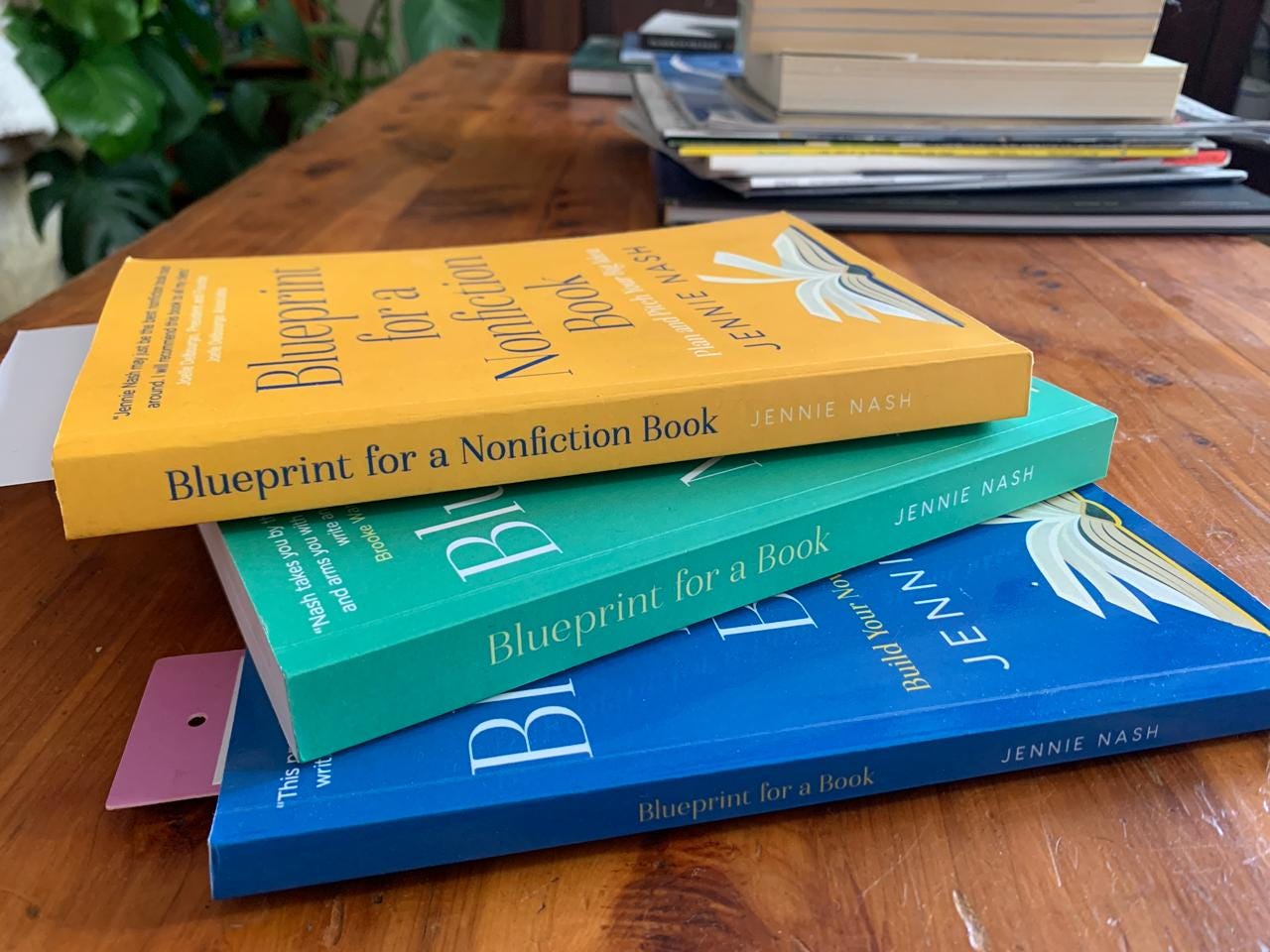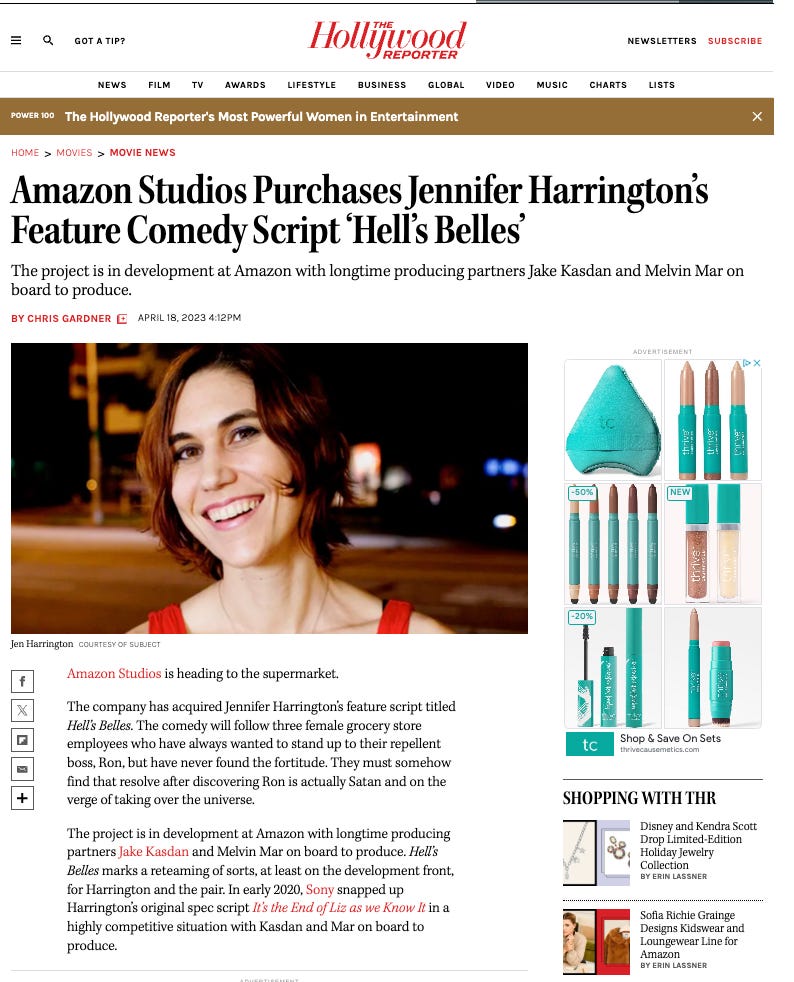Welcome to Women Writing! For over a year now, Author Accelerator trained book coaches in Canada have been collaborating to bring together our individual members into Book Coaches Canada. Of course, as individuals, we’ve been working collaboratively for much longer than that! I’m so proud to be a part of this organization of very fine people. Our first official post, “What Does a Book Coach Do? And Why Should I Work with One?” written by Alex Van Tol, came out last week. Please take a look and share with anyone you think might benefit from a book coach, or just wants to know what we do.
About the author…
Jennifer Harrington is a screenwriter and film director living in Los Angeles. Her most recent scripts, HELL’S BELLES (Hollywood Reporter), and THE END OF LIZ AS WE KNOW IT (Hollywood Reporter), were sold to Amazon Studios and Sony Pictures, respectively, with Jake Kasdan and Melvin Mar attached to produce. Previously, she wrote and directed the horror feature SHOOK, acquired by the streamer Shudder and reviewed by the Wall Street Journal as a "guilty pleasure.” Her first feature, HOUSEKEEPING, was released by Lionsgate and After Dark Films. In the documentary world, she was co-executive producer and a director for the doc-series DEAR… for Apple TV+ (Variety) and RJ Cutler. As an editor, she has edited several award-winning documentary features and countless television shows. She has two film degrees: a BFA from UCLA and an MFA from USC.
On a writing routine …
Up until five years ago, I never had a writing routine. I was always working another job (producing, editing or directing usually) and I wrote whenever I could find time amidst my busy schedule. This usually meant nights and weekends. It wasn’t until I was able to focus on writing full-time that I realized that I needed more structure. I was so used to writing when I was free, and now I was always free, and so… I was always writing! I never took time off and I was headed towards burnout. I realized that I was now my own boss and my boss kind of sucked. So, I started to institute some rules like, ‘no working nights or weekends unless inspired to or there is an impending deadline.’ This made a huge difference. I was actually more productive working fewer hours because I wasn’t exhausted and my mind was fresh. Soon after that I started experimenting with getting up early to write. This was a huge shift for me because I’ve never been a ‘morning person,’ but I wanted to see what the buzz was all about. Every writer I talked to went on and on about how great it was to write in the early hours while everyone else was asleep. It took me awhile to get the hang of it, but I too fell in love with the quietness of those hours.
“The one sure fire way to stand out is to use your own voice. To be you. No one else can do that.”
On writing spaces …
Where I write tends to shift around. For a long time I was writing on the couch in the living room. Then I shifted to the kitchen table in front of the window looking out at the hills across from us. Then I moved to my desk in my office where I have this quote tacked on the wall: John Carpenter on his movies reaching cult status: "It's great. It's better than people calling me a piece of shit all the time.". Then my bed. Then back to the couch… I mix it up. These days I almost always have my AirPods in and am listening to some classical music to help me focus. If I have a candle available, I’ll light it.
On writing communities …
am a member of the WGA, otherwise known as the Writer’s Guild in the film industry. It has helped as far as having an organization that is always making sure I get paid on time and am treated fairly. The strike in 2023 was pretty rough, but unfortunately it was also necessary. The union was incredibly supportive of its members at that time and continues to be a source of guidance for me as I navigate this crazy career.
On challenges …
Making money. I left graduate school with mountains of student loan debt and lived in a city where rent (and everything else) was expensive. My goal had always been to write and direct films, but I couldn’t do that from a cardboard box on the street. Finding a balance of working jobs to support myself versus making time to write was something I struggled with for many years and I can’t say I ever got it right. Sometimes I look back and wonder if I by getting myself jobs I was giving myself a safety net that kept me from pushing hard enough to get my work out there. I know that when I finally decided I was done climbing the ladder of a career I didn’t want (producing documentary television), I finally sold a script. Was this coincidence? I don’t know.
On the best writing advice …
Best advice—don’t write to the market, just write what you want. In the film industry, people are always trying to guess future trends and what will be in demand. As a writer you often feel like you need to chase after it, if people are buying stuff about witches and time travel, then you try to make your next script about witches and time travel. The problem with this? You actually are decreasing your odds of getting noticed, because now you just wrote what everyone else is writing. The one sure fire way to stand out is to use your own voice. To be you. No one else can do that.
On the worst writing advice …
Worst advice—follow the rules. There are a lot of ‘rules’ in screenwriting about what you can and can’t do. Not just in formatting, which has lots of specific measurements of margins etc., but in what you’re allowed to write. An example of this is to not include camera placement/description. However, if you are writing visually, which you should be if you’re a screenwriter, a lot of the time a joke or a reveal is dependent on how the camera is placed. I followed the rules like a good girl for forever and it wasn’t until I started breaking them and letting myself shine through that my work connected with people. Rules are great to know - but you can always break them if you do so with intention and purpose.
On advice from personal experiences …
Sexism is still alive and it is affecting you whether your realize it or not. We tend to take our setbacks and failures totally upon ourselves, assuming we weren’t good enough. However, when I look back now at the many years I struggled, I can see more clearly. As a woman I was at an extreme disadvantage time and again, and being told I wasn’t. I believed it, of course, I thought I was the problem. My advice to women is there is a difference between personal accountability and living in a society that views you as less than.
On a recent publication …
I’m currently working on my next spec script. The last two are at Sony and Amazon, respectively, crawling their way through development. While I wait, I’m writing something new. I have yet to master the art of pitching for an open writing assignment—where you get hired to write a specific story.
Jen’s online spaces …
📚 Upcoming:
Women Writing Circle
The Women Writing Circle meets on the second and last Monday of the month from 6:30-8:00 PM EST. This offering is for paid subscribers. You can learn more about the benefits of subscribing here. I’m looking forward to creating a magical writing community with you, and getting some pages written in 2025.
Spring Group Book Coaching
Join my 8-week Spring Group Book Coaching . This session is ideal for individuals who have an idea for a novel or memoir and need guidance to get started, or who have a draft and need a plan for revision. You will receive a weekly group book coaching session and individual feedback every week on submissions, as well as weekly goal setting. This is a hands-on, interactive, and personalized coaching program that will help you:
Clarify your book idea and goals
Develop your ideas and hone in on your point
Participate in craft exercises and discussion
Create a plan to move your project forward
Get honest and compassionate feedback from me and your peers
Stay motivated and accountable to your deadlines
Find the joy in your writing practice
Happy writing!











